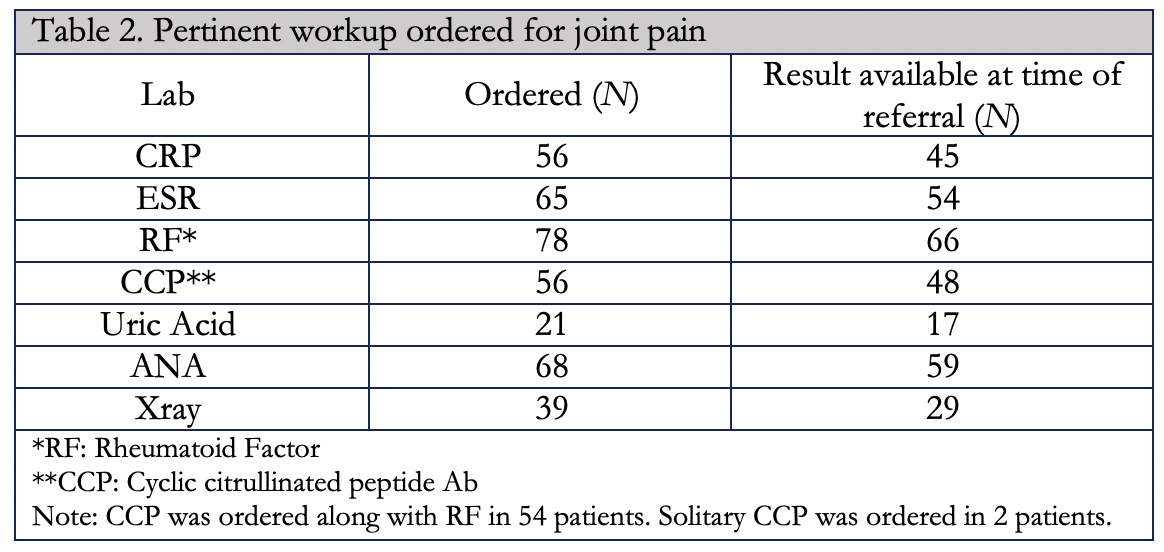Session Information
Date: Monday, November 8, 2021
Title: Health Services Research Poster II: Care Models and Innovation (1061–1082)
Session Type: Poster Session C
Session Time: 8:30AM-10:30AM
Background/Purpose: Electronic consultations (eConsults) are increasingly utilized to supplement or replace face to face (FTF) visits in different medical specialties. They are especially valuable in underserved communities where timely access for a FTF visit with a rheumatologist is limited by various factors including transportation and limited rheumatology workforce in the area. Further, eConsult assistance with obtaining rheumatology diagnostic evaluations prior to FTF visits expedites patient care. Unfortunately, care is delayed if vital information is not included in eConsults to rheumatology. This study was thus designed to identify gaps in the eConsult referral process for chief complaints of joint pain through the Inland Empire Health Pan (IEHP), the largest insurance plan in an underserved region of Southern California.
Methods: Seven rheumatologists at Loma Linda University Health were surveyed on what information in the eConsult interface would provide the rheumatologist with necessary information to triage the patient into 3 categories: 1. Close for FTF visit, 2. Change in specialty, 3. Hold on FTF pending trial of medication or further diagnostics. 100 eConsult referrals to rheumatology for joint pain were then randomly selected and retrospectively reviewed for this information, which included: description of joint pain in patient’s history of personal illness (HPI; to include description of involved joints, inflammatory vs mechanical pain, presence of swelling, stiffness, association with physical activity), laboratory workup, and x-rays of affected joints.
Results: Among 100 referrals for joint pain, affected joints were specified in 54 and generalized joint pain noted in 12 (Table 1). Information to differentiate between inflammatory vs mechanical joint pain was only provided in 34 consults with presence or absence of swelling noted in 21(62%) of these patients. Rheumatoid factor was ordered in 78 patients, of whom 54 (69%) also had a serum CCP evaluated (Table 2). ANA was ordered in 68 patients, however only seven of these patients had symptoms or indications of connective tissue disease noted in their HPI: 5 with rash, 1 with alopecia and rash, 2 with shortness of breath, 1 with anemia. X-rays were ordered in 39 patients and results were available in 29 at the time of rheumatology appointment. In total, 84 referrals were triaged to a FTF visit, 6 resulted in a change in referral specialty, and 10 were recommended trial of medication or further diagnostics prior to FTF visit.
Conclusion: We find that joint pain referrals made through the IEHP eConsult interface lack important information to guide rheumatologists in their diagnosis and appropriate triage of patients. This can potentially lead to delays in treatment. To optimize the process, a checklist can be displayed in the interface at time of referral to assure that joint pain is thoroughly described in the HPI, associated symptoms are included, and related labs and imaging are ordered in a timely manner. We plan to expand this study to include referrals for positive immunological markers such as ANA.
 Table 1. Information provided in history of personal illness
Table 1. Information provided in history of personal illness
 Table 2. Pertinent workup ordered for joint pain
Table 2. Pertinent workup ordered for joint pain
To cite this abstract in AMA style:
Chiruvolu N, Sandhu V. Optimizing Joint Pain EConsult Referrals in an Underserved Region of Southern California [abstract]. Arthritis Rheumatol. 2021; 73 (suppl 9). https://acrabstracts.org/abstract/optimizing-joint-pain-econsult-referrals-in-an-underserved-region-of-southern-california/. Accessed .« Back to ACR Convergence 2021
ACR Meeting Abstracts - https://acrabstracts.org/abstract/optimizing-joint-pain-econsult-referrals-in-an-underserved-region-of-southern-california/
